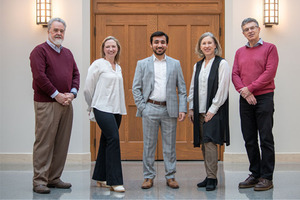 Pictured: Ray Offenheiser, Josefina Echavarría Alvarez, Aref Dostyar, Lisa Schirch and Laurie Nathan
Pictured: Ray Offenheiser, Josefina Echavarría Alvarez, Aref Dostyar, Lisa Schirch and Laurie Nathan
In August 2021, as the Taliban was taking over control of Kabul, Afghanistan, faculty at the Kroc Institute for International Peace Studies began having conversations in the halls about how to respond given the Institute’s history of supporting Afghan peace and development efforts.
The tragic events came in the midst of new initiatives following the Doha Peace Accords by the Institute’s Peace Accords Matrix program (PAM) and ongoing research by Research Professor Madhav Joshi to support women’s rights in Afghanistan. Professor Emeritus David Cortright’s work in Afghanistan had resulted in a book on ending the US war in Afghanistan.
In response to the news from Afghanistan, several Kroc Institute faculty members quickly organized a virtual Flash Panel on the Unfolding Situation in Afghanistan on August 26.
In August, Lisa Schirch was also relocating to South Bend, Indiana, to take on a new role as Richard G. Starmann, Sr. Professor of the Practice at the Kroc Institute. In the midst of a move, Schirch was also working to help Afghan colleagues leave the country and to find ways to preserve the existing “brain trust” of peacebuilders and mediators in Afghanistan.
“Afghanistan has an unusual amount of capacity for peacebuilding due, in part, to large investments in peacebuilding efforts over many decades,” said Schirch.
Amidst this flurry of activity, Kroc Institute faculty members continued conversations with colleagues at the Pulte Institute for Global Development, a fellow Institute within Notre Dame’s Keough School of Global Affairs, and from these conversations, the Afghan Peace and Development Research Program (APDRP) was born. The APDRP is a collaborative program to support and amplify the voices of Afghan peace and development scholars and practitioners.
“Both peacebuilding and development practitioners working in Afghanistan want to know the long term development trajectory for the country,” said Ray Offenheiser, William J. Pulte Director of the Pulte Institute. “How do we move from a situation where things are falling apart to having a country that’s a decent place for people to live and prosper. The humanitarian work is an area where Kroc and Pulte’s work is linked.”
The Program is led by a group of Kroc and Pulte faculty whose expertise includes peacebuilding, development, mediation, peace agreement negotiation and implementation, and more. In addition to Notre Dame faculty, two Kroc Institute alumni from Afghanistan serve as Program advisors: Aref Dostyar (M.A. ’16), former Consul General of Afghanistan in Los Angeles and a current Scholar in Residence at the Kroc Institute, and Malalai Habibi (MGA ’19), program officer with the International Civil Society Action Network. Faculty members are in the process of identifying additional Afghan advisors to support the program as well.
The APDRP builds on the foundation of the above events and research, as well as a public seminar in October at the Keough School’s Washington office that featured male and female Afghan entrepreneurs, diplomats, policymakers and academics leaders offering concrete proposals to D.C. policymakers.
Since its formation in January 2022, the APDRP has hosted a number of public and private events addressing the ongoing crisis in Afghanistan. On Feb. 21, Laurie Nathan, Mediation Program Director at the Kroc Institute, co-sponsored a public webinar with the Peace Research Institute of Oslo (PRIO) focused on the expected March 2022 revision of the United Nations Assistance Mission in Afghanistan (UNAMA). Panelists at the event included representatives from the Afghan Women’s Network, the Afghanistan Women’s Chamber of Commerce and Industry, the International Crisis Group, and the Norwegian Ministry of Foreign Affairs.
Also in February, the APDRP convened an off the record Track II dialogue that brought together a diverse group of Afghan leaders and representatives from the international community, including individuals from the UN and key international aid agencies, for a conversation focused on how the international community should best respond to the humanitarian crisis in Afghanistan.
Both of these events were significant in their ability to bring together diverse stakeholders in conversation.
“Through the APDRP, we want to model inclusivity in both our process and our outcomes,” said Nathan. “Peacemaking will not work if it’s exclusive.”
At the request of Afghan peacemakers, the APDRP will also draw on the expertise of the PAM to help understand what broke down during the Doha Peace Process and assess possible ways forward in crafting new, inclusive peace processes.
“The APDRP seeks to deal with more than just those situations that get media attention,” said Josefina Echavarría Alvarez, PAM director. “We are seeing patterns and dynamics that existed before this current crisis, and we’re trying to understand how those patterns continue. We want to try to dig deeper and tap into peace infrastructures that already exist to help build and sustain peace moving forward.”
Program faculty are continuing to plan future initiatives that support public forums highlighting Afghan voices, intentional dialogues between Afghan and international civil society and government leaders, and providing opportunities for ongoing networking around Afghan peacebuilding and development. Dostyar is hopeful that the location of the program at Notre Dame, an internationally-respected educational institution, as well as the connections of many APDRP faculty members to peacebuilders and development professionals living and working on the ground in Afghanistan, will continue to open possibilities to support peacebuilding and development work on the ground.
“Afghanistan is my home. I believe I exist to work for peace in my country,” said Dostyar. “Our Program has a specific emphasis on amplifying Afghan voices, and I support and promote that type of approach. Afghans should be at the forefront of all of these conversations, since they will be impacted first and most.”
The APDRP continues to build and seek new partnerships to support this ongoing work.